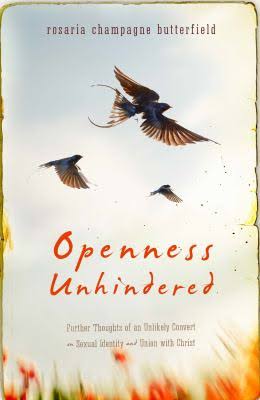⏱️ Estimated Reading Time: 4 min read
Growing up in an evangelical church, I heard a lot of dramatic testimonies. At summer camp or during a church service, someone would occasionally stand up and tell the story of how lost and sinful they had been before Jesus transformed their lives. As powerful as these stories were, I almost got the impression that living a life of sin was a prerequisite to getting saved. My testimony was pretty much the story of growing up in the church, learning to trust Jesus because everyone around me did, and desiring to grow up to serve and follow Jesus. Did I need to go out and sin for awhile so I could spice up my testimony?
This popular narrative structure for testimonies inadvertently taught me to put too much emphasis on the moment of conversion and not enough on the life of faith that follows. Rosaria Butterfield’s first book, Secret Thoughts of an Unlikely Convert, tells the story of how she came to faith in Jesus and explains the consequences this conversion had on her career as a professor in the Queer theory department. Butterfield’s follow up book, Openness Unhindered, in some ways tells an even more important story. This is the story of how she has persevered in the faith. This book is targeted at those who struggle with unwanted homosexual desires. Butterfield provides sympathy but stalwart courage to face the lifelong challenges of struggling against sins.
But even a believer with a boring testimony like mine will find riches in her thorough introduction to the ongoing work of sanctification. Readers will leave firmly convinced of the role of the church community in this work. We are to support one another, opening our lives up to one another in hospitality (which is, coincidentally, the subject of her most recent and my favorite book of hers: The Gospel Comes With a House Key.)
Butterfield also walks through, step by step, what it looks like to live a life that depends on grace every moment in her chapter on Repentance. Too many books and articles drift towards easy platitudes about victory over sin, but Openness Unhindered lays out in detail the nature of sin in the life of a believer. As Butterfield explains “I expected that all of my sinful feelings ought to go away now that I am in Christ. I expected that knowing better should solve the problem of the repeat offense of sin. But after I was converted, it seemed like my struggle with sin was just ramping up” (62). She parses out the difference between different kinds of sin, and draws a line between the act of admitting sin (acknowledging what I did was wrong but also explaining the ways in which this sin is simply endemic to who I am) and confessing sin (repenting of sin and recognizing my inability to battle sin alone.) This may seem like merely parsing words, but this seemingly small distinction provides the framework for the rest of Butterfield’s theology of identity in Christ. Recently it has become popular to replace the word sin with brokenness (which makes us sound like passive victims of sin) or to celebrate our failures or our messiness in a kind of pseudo-humility. Rosaria Butterfield will have none of this. She calls sin what it is, addresses how it affects even our most instinctual desires, and reminds us of all the means of grace we have to resist temptation.
What I admired most about this book was her willingness to allow a friend who disagrees with her position to explain her objections. Butterfield rejects the term “gay Christian” (which she explains more fully in the chapter on Self-Representation) but she invites a friend to share her counter-argument in the chapter on Conflict. Especially on this sensitive topic of sexual identity, it is easy for writers to become so emotionally invested in their position that they are unable to wrestle with the ideas behind their position. Butterfield disagrees vigorously with her friend, but this does not diminish the quality of their friendship. If anything, Butterfield seems determined to make and keep friends with whom she does not agree. Butterfield argues in the realm of ideas without making her disagreements personal or divisive.
Butterfield’s skills as a voracious reader and researcher of the Scriptures, combined with her background in identity politics, uniquely position her to speak clearly and persuasively on how to understand identity in Christ. She recognizes a half-answer when she sees one, and she doesn’t rest until she uncovers a better answer. Butterfield has written a helpful and very personal guide to sanctification. Openness Unhindered is a logical ordering of the story told in her first book, and serves as a systematic approach that will help people struggling with unwanted sinful impulses.




